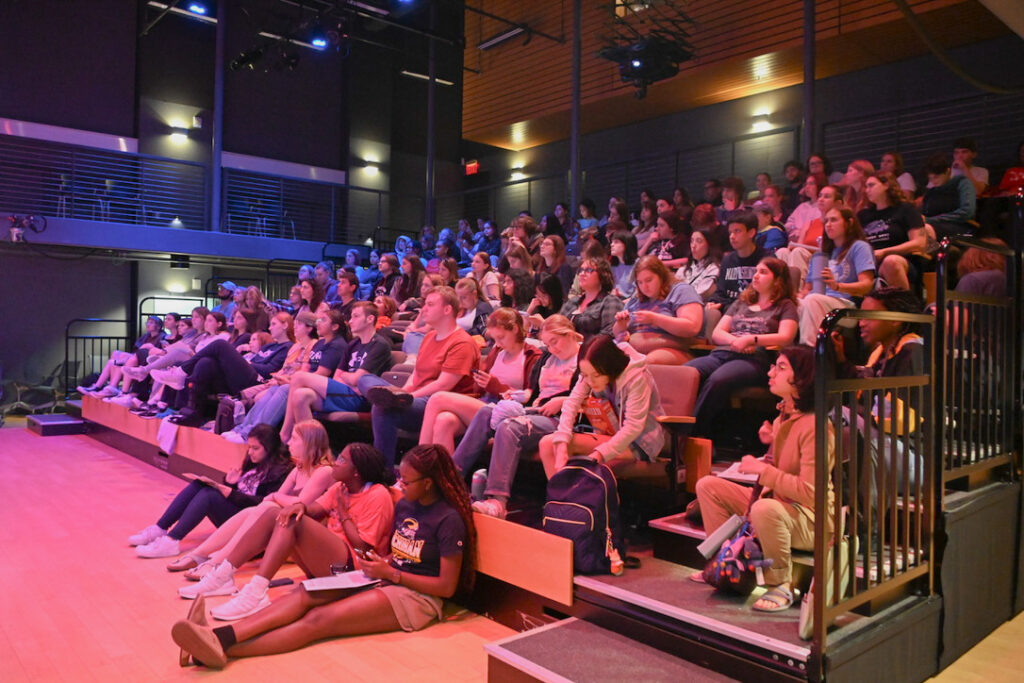UMW hosts 2024 presidential debate watch party
3 min read
Students congregate in the Digital Auditorium as the 2024 presidential debate commences. | Abbey Magnet, The Weekly Ringer
by ALANAH MULLER
Staff Writer
On Sept. 10, the University of Mary Washington Political Science Department held a watch party for the first 2024 presidential debate between former President Donald Trump and Vice President Kamala Harris.
The event was hosted by Professor of Political Science and Department Chair Rosalyn Cooperman and Assistant Professor of Political Science Jared McDonald. Both professors are teaching first-year seminars this semester, with Cooperman teaching U.S. Campaigns and Elections and McDonald teaching Political Polarization.
“It made a lot of sense to organize something around the first (and maybe only) debate between Trump and Harris,” said McDonald. “For first-year students, I think it’s important for them to get a sense of just how engaged our campus is in politics at all levels of government, and how important it is for them to add their voices to the conversation. We owe a huge debt to our FSEM peer mentors, Sarah Tyree-Hermann and Martina Pugh, for organizing the event.”
At 8:30 p.m., Cooperman and McDonald gave an opening introduction, followed by a discussion and a brief question and answer period. This gave attendees time to ask questions about the debate, as both McDonald and Cooperman have Ph.D.s in political science from Vanderbilt University and in government and politics from the University of Maryland, College Park, respectively.
“My expertise is in two main areas – U.S. political parties and gender and political candidacy,” Cooperman said. “I study how Democratic and Republican parties attract and support political candidates, especially women. I also study the campaign finance of women candidates.”
Mcdonald’s studies focus on political behavior, “which encompasses everything from public opinion on policy to voting behavior in American elections,” he said.
Both professors provided insight into the reasoning behind presidential debates and their effect on the campaigns. With one of Cooperman’s areas of expertise being women in politics, she also spoke about how the recent change in democratic nominees piqued her interest.
In the pre-debate speech, McDonald spoke about how he was interested to see the candidates’ behavior during the debate.
“One thing I remember clearly was talking about my interest in seeing how much focus there would be on substance, or specific policies, and how much would be focused just on character and temperament to hold power,” he said.
A presidential debate is a time for the candidates to share their policies and fundamental beliefs with viewers who may not be familiar with their perspectives. Both candidates answer questions that define their stances on a wide range of topics, including immigration, reproductive rights and the economy.
“I get into a lot of abstract, esoteric concepts when we talk about political polarization, but a contentious debate like the one we saw really showcases just how deep the divisions in this country really are,” said McDonald.
By 9 p.m., the Digital Auditorium was full of students actively engaged and interested in learning more from both candidates. According to McDonald, there was standing room only for most of the 90-minute debate. This election is the first many can vote in, as numerous freshmen turn 18 years old.
“I enjoyed the event, and I did consider it worthwhile because this debate is very important to understand what each candidate had to say about what they could offer to us in the future,” said freshman political science major Maria Lopez Lluberes. “As someone who has an interest in politics, I find it important to be a part of this period of history because it’s good to have knowledge of your surroundings and what is happening whether you like politics.”
On Oct. 2, UMW is hosting Virginia’s 7th Congressional District debate between Eugene Vindman and Derrick Anderson at 7 p.m. in George Washington Hall’s Dodd Auditorium.
“UMW students have a remarkable history of political and civic engagement, and the Department of Political Science & International Affairs is delighted to work with campus programs and student groups to sponsor events to encourage that interest,” Cooperman said. “Elections matter, and the first step to getting involved is getting educated about the candidates and issues.”


